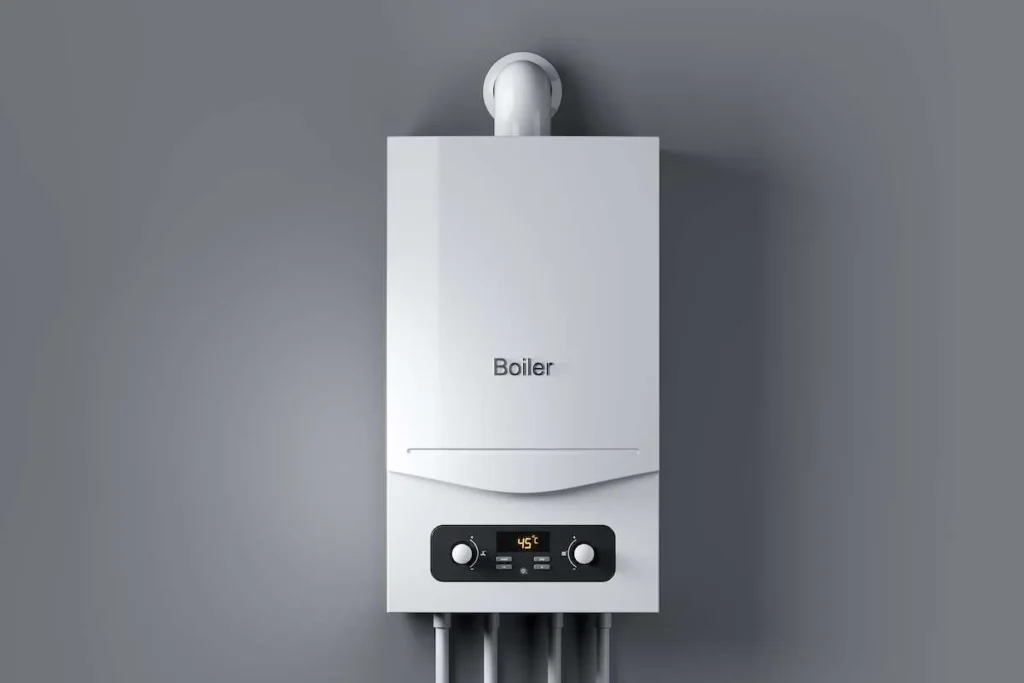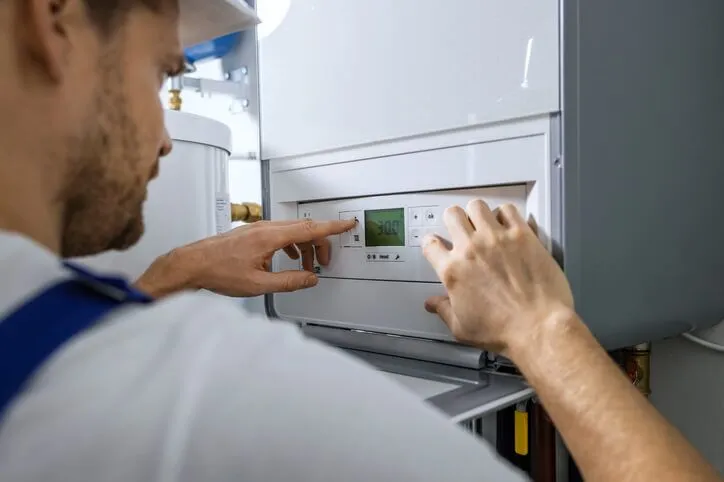If your boiler is old, noisy, or taking up too much space, you’re not alone. Many Rhode Island homeowners face the same problem.
Upgrading to a combi boiler can solve both comfort and efficiency issues.
In this guide, you’ll learn exactly what a combi boiler is, how it works, the pros and cons, costs in Rhode Island, and what’s involved in removing your old boiler during replacement.
What Is a Combi Boiler?
A combi boiler is a single unit that provides both central heating and hot water on demand, without the need for a separate storage tank.
Key Takeaways
- A combi boiler combines heating and hot water in one compact unit.
- Ideal for homes with limited space and moderate hot water demand.
- Costs in Rhode Island vary, with installation and old boiler removal impacting price.
- Pros include efficiency and space savings, while cons include limited simultaneous hot water.
- Professional removal of your old boiler ensures safe and cost-effective installation.
What Is a Combi Boiler?

A combi boiler, short for combination boiler, is a single unit that provides both central heating and on-demand hot water. Unlike traditional boilers with a separate water storage tank, a combi boiler heats water directly from the main supply.
This makes it compact, efficient, and popular for homeowners who want modern heating without sacrificing storage space. It’s especially useful in smaller homes or those looking to simplify their heating system.
How Combi Boilers Work
A combi boiler connects directly to your main water supply. When you turn on a hot tap, cold water flows into the unit. The boiler’s heat exchanger quickly warms the water and delivers it instantly to your faucet or shower.
At the same time, it provides heat to your radiators or baseboard system. Because it only heats water when you need it, there’s no standby heat loss like with storage tanks.
Fuel options vary. In Rhode Island, natural gas and oil remain the most common, though electric models also exist. The key is choosing the right size and type for your household’s needs.
Pros and Cons of a Combi Boiler
Pros
- Saves space by removing the need for a separate water tank.
- Energy-efficient since it heats only the water you use.
- Provides unlimited hot water on demand.
- Often quicker and easier to install in smaller homes.
Cons
- A limited flow rate means running multiple showers at once can reduce pressure.
- Higher-demand homes may need larger or alternative systems.
- More complex internal parts can mean higher repair costs if something fails.
For Rhode Island households, a combi boiler is often a smart choice for small to medium homes with average hot water needs, though many homeowners still ask, Do you need a permit to install a furnace?, before moving forward with any heating upgrade.
Cost of Installing a Combi Boiler in Rhode Island
The cost of a new combi boiler in Rhode Island typically ranges from $4,500 to $15,000, including installation. Factors that affect the price include:
- Size of the boiler and output capacity.
Fuel type (gas, oil, or electric). - Condition of existing plumbing and heating system.
- Whether permits or additional upgrades are required.
Local utility rebates or federal incentives may reduce costs. Comparing quotes from licensed contractors helps you get the best balance of price and quality.
Removing My Old Boiler During Replacement
Before a new combi boiler can be installed, the old boiler must be removed safely. This process involves:
- Disconnecting fuel lines and water supply.
- Draining the system completely.
- Detaching the old boiler and piping.
- Safely transporting and disposing of the heavy unit.
Removal can add $500 to $1,500 to your project, depending on the size and condition of your old boiler. In older Rhode Island homes, issues like asbestos insulation or tight basement spaces can make removal more challenging and costly.
Working with a professional ensures safety, proper disposal, and compliance with local codes.
Is a Combi Boiler Right for My Home?
The best way to know if a combi boiler fits your home is to consider:
- Hot water demand: Do you often run two showers at once? If yes, check capacity carefully.
- Heating system: Works best with radiators or baseboards, though some conversions are possible.
- Fuel availability: Natural gas is most common, but oil and electric options exist.
- Space: Combi units are compact, ideal for homes with limited utility room or basement space.
For Rhode Island homeowners with small to mid-sized properties, a combi boiler is often a smart choice.
Maintenance, Lifespan, and Efficiency

With proper care, a combi boiler can last 12 to 15 years. Annual servicing keeps it running safely and efficiently.
Maintenance tasks include checking pressure, cleaning the heat exchanger, and flushing the system to prevent scale build-up.
Efficiency is one of the biggest selling points. Many combi boilers achieve 90%+ AFUE ratings, meaning lower energy bills and reduced emissions compared to older systems.
Case Study: A Rhode Island Example
A Cranston homeowner replaced their 25-year-old oil boiler with a modern gas combi boiler.
The old boiler took up half the basement and delivered inconsistent hot water. After professional removal and installation, the new combi freed up space, cut heating bills by 20%, and provided steady hot showers without delay.
Thinking about upgrading to a combi boiler? The experts at Acorn Oil Co can help.
From safe removal of your old boiler to expert installation of a new system, we’ll guide you every step of the way. Get your free quote today and enjoy comfort, efficiency, and peace of mind.
Frequently Asked Questions
1. How long does a combi boiler last?
Most last 12–15 years with annual servicing.
2. Can a combi boiler handle two showers at once?
It depends on the unit size. Larger models can; smaller ones may struggle.
3. How much does removing an old boiler cost?
Typically $500–$1,500, depending on size and removal complexity.
4. Do I need a permit to install a boiler in Rhode Island?
Yes, permits are usually required. Your contractor will handle the paperwork.
5. Is a combi boiler more efficient than a tank system?
Yes, because it heats water only when needed, reducing standby energy loss.
6. What fuel types are available for combi boilers?
Gas and oil are most common in Rhode Island, though electric models exist.
Conclusion
A combi boiler is a space-saving, efficient option for many Rhode Island homes. It provides both heat and hot water in one unit, but it’s important to consider your hot water demand, home size, and removal costs.
If you’re ready to make the switch, talk to Acorn Oil Co for professional advice and installation.